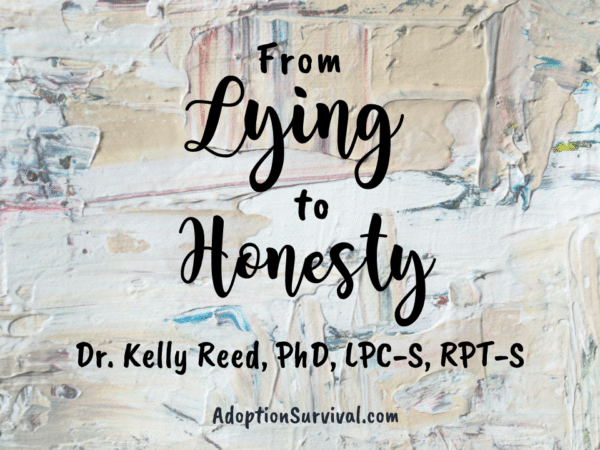
For anyone to be healed from lying, they must discover what is driving them to lie in the first place. Honesty begins with oneself. Honesty with oneself and others—by accepting and telling the truth—is the foundation of lasting relationships and a must for security and well-being. So, what can you do to help your child progress to honesty? You can start by trying to understand the reasons why your child is lying. (Our list of various reasons people lie is in the previous blog post). When you have an idea of why your child is lying, you can respond more effectively.
How to address lying varies for each child as does his or her reasons for lying. There is no single way to solve every child’s lying. However, according to Victoria Talwar and her colleagues who study children’s lie-telling behavior, forcefully confronting any suspected lying and threatening with punishment only make children work harder to become better and more frequent liars.
If you are trying to get to the truth with your child, you can help your child justify his or her actions by saying how reasonable it is to avoid embarrassment or to want to make a good impression. You can use phrases like: “You wish that were true.” “You’re embarrassed and didn’t want me to find out.” “You want your brother to get in trouble so he cannot go to his friend’s house, because you’re upset you’re not going to a friend’s.”
- Making children aware of their reasons for lying will help them to understand themselves better and to feel better understood by you. It is important to help them learn the alternative to lying is to be honest. “I wish I had a cool story to tell my friends about what we did this summer.” “I’m embarrassed and did not want to tell you I got a C on my test.” “I really don’t want to get in trouble for breaking the lamp because it was an accident.” You might need to work on acknowledging and accepting some of their honesty. It may mean being careful you hear your child’s honesty and do not focus on something else. If your son says, “I don’t like this shirt you bought me,” rather than focusing on his lack of gratitude and the money you spent, be glad he told you the truth. Try to always be positive whenever your children tell the truth.
- When possible, avoid lecturing or criticizing your child which can be counter-productive, leading to defensiveness and more lying. Do not ask a question when you already know the answer, because it is often an invitation for children to lie. Instead of saying “Is your bag ready?” say, “I noticed your bag isn’t ready.” Please do not call your child a liar as it can lead to more lying to confirm your expectations. It can also trigger trauma of past name calling (e.g., “You’re a bad kid.” “You’re stupid.”). Further, your child may be convinced that change is impossible and quit trying not to lie. It is also not helpful to bring up past transgressions such as, “This is the fourth time you have lied this week.” Remember to be a good model for what you want from your children. Praising them for telling the truth may encourage them to be less likely to lie. You can also help them to see that a little deceit is not worth defending because the more they lie, the more it becomes a problem in their life.
- As you use the list of various reasons for lying to help determine your child’s intent for lying, you may start to notice a pattern providing insight into your child’s lying. Perhaps you will come to the realization that your child is lying about his or her grades because of perceived pressure to achieve. If your child repeatedly lies to avoid discipline, perhaps reassessing your consequences with your child might be helpful. The point of consequences should be to teach your child, not inflict distress.
- Parents have mentioned the frustration of their child laughing when caught telling a lie. Inappropriate laughter can be a sign of anxiety. It is most likely that their laughter is due to anxiety about getting caught and what might happen, rather than because they thought their lie was funny. Pointing out the anxiety will help them learn to be honest. Their lying behavior might not be accepted, but their nervousness can be accepted. You can communicate that you understand them and desire to help them recognize possible reasons for their behavior. Verbally pointing out nervous behaviors like inappropriate laughter or lack of eye contact might also help you to avoid taking the behavior personally.
The more you understand the reasons for lying, the better you will understand your child, allowing you to provide more effective help for your child. Some research suggests children often lie out of fear. Therefore, once the fear is reduced, the lying will also decrease. However, determining the root cause of the child’s lying is not always straightforward which makes reducing or eliminating lying difficult. Therapy may be helpful in figuring out why your child feels the need to deceive, but ultimately, your child must purposely make the choice to tell the truth. For most children, increasing self-confidence (which lowers their anxiety and need for control) and feeling understood and accepted by themselves and others will be more therapeutic. It is much more difficult to help those who use manipulation and self-deception, but continuing to confront them and to point out things from others’ perspective may yield benefits eventually.


